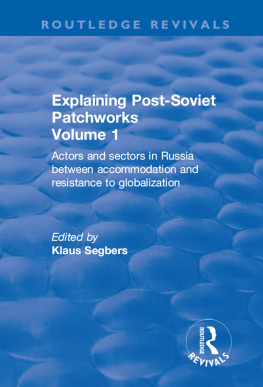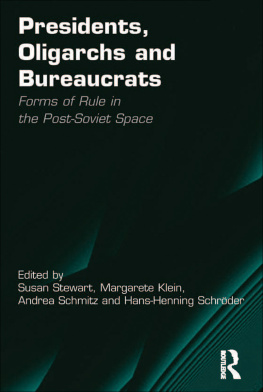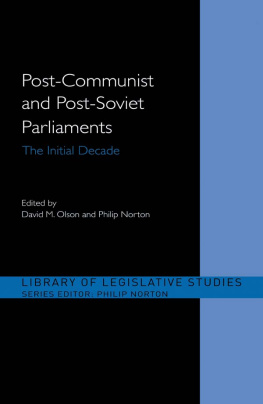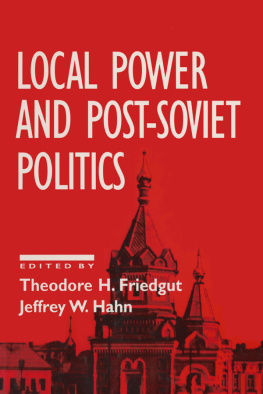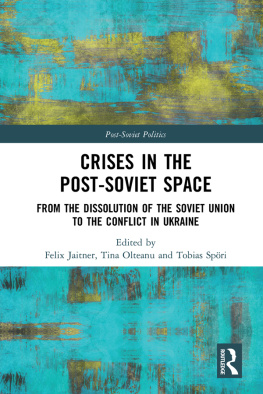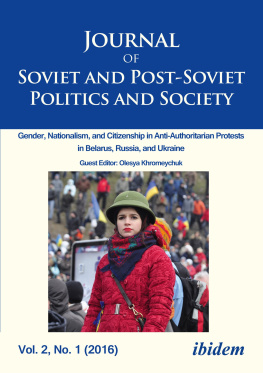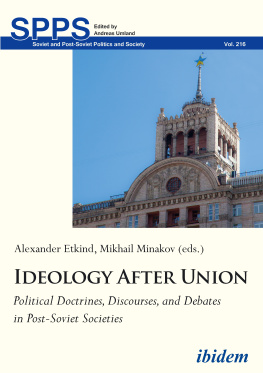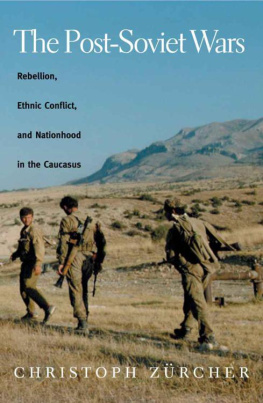First published 2001 by Ashgate Publishing
Reissued 2018 by Routledge
2 Park Square, Milton Park, Abingdon, Oxon OX14 4RN
711 Third Avenue, New York, NY 10017, USA
Routledge is an imprint of the Taylor & Francis Group, an informa business
Copyright Klaus Segbers 2001
All rights reserved. No part of this book may be reprinted or reproduced or utilised in any form or by any electronic, mechanical, or other means, now known or hereafter invented, including photocopying and recording, or in any information storage or retrieval system, without permission in writing from the publishers.
Notice:
Product or corporate names may be trademarks or registered trademarks, and are used only for identification and explanation without intent to infringe.
Publishers Note
The publisher has gone to great lengths to ensure the quality of this reprint but points out that some imperfections in the original copies may be apparent.
Disclaimer
The publisher has made every effort to trace copyright holders and welcomes correspondence from those they have been unable to contact.
ISBN 13: 978-1-138-70253-0 (hbk)
ISBN 13: 978-1-315-20973-9 (ebk)
Alimova, Tatiana A.
Born 1951, PhD (Economics), Leading Researcher at the Russian Independent Institute of Social and Nationalities Problems (RIISNP), Moscow, Russia
Balzer, Harley D.
Born 1948, Associate Professor of Government and Director of the Center for Eurasian, Russian and East European Studies, Georgetown University, Washington D.C., USA
Fortescue, Stephen
Born 1952, Associate Professor, School of Politics and International Relations, University of New South Wales, Sydney, Australia
Gurkov, Igor B.
Born 1965, PhD (Economics), Professor, Head of the Laboratory for Organizational Development at the Higher School of Economics, Moscow, Russia
Heinrich, Andreas
Born 1970, PhD Candidate, Research Fellow at the Institute for East European Studies, Free University of Berlin, Germany
Hishow, Ognian
Born 1951, PhD, Researcher, Foundation Science and Politics (SWP), Berlin, Germany
Iudina, Irina N.
Born 1960, PhD Candidate, Senior Lecturer, Chair of World History and International Relations, Altai State University, Barnaul, Russia
Kalugina, Zemfira I.
Born 1938, Professor of Sociology, Head of Department of Social Problems, Institute of Economics and Industrial Engineering, Russian Academy of Science, Siberian Branch, Novosibirsk, Russia
Kosals, Leonid I.
Born 1956, PhD, Leading Researcher at the Institute for Socio-Economic Problems of the Population, Russian Academy of Sciences, Moscow, Russia
Krasnov, Grigorii V.
Born 1973, Senior Associate Private Equity, Bank of America Equity Partners Europe, London, UK
Peregudov, Sergei P.
Born 1925, Professor, Senior Researcher of the Institute of World Economy and International Relations of the Russian Academy of Sciences, Moscow, Russia
Pukhov, Ruslan N.
Born 1976, Aspirant of the State Institute for International Relations (MGIMO), Director of the Center for Analysis of Strategies and Technologies (CAST), Moscow, Russia
Rytsareva, Elena K.
Born 1969, special correspondent, Ekspert magazine, Moscow, Russia
Ryvkina, Rozalina V.
Born 1926, Professor for Political Economy, Head of Department at the Institute for Socio-Economic Problems of the Population, Russian Academy of Sciences, Moscow, Russia
Sarkisiants, Artos G.
Born 1958, PhD (economics), Deputy Head of the Department of International Financial Institutions, Ministry of Finance of the Russian Federation, Moscow, Russia
Segbers, Klaus
Born 1954, Director of the Institute for East European Studies and Professor for Political Sciences at the Institute for East European Studies and the Department for Political and Social Sciences, Free University, Berlin, Germany
Serova, Evgeniia V.
Born 1956, Professor, Head of the Centre of Agri-Food Economics (Institute for Economy in Transition), Head of Department on Applied Microeconomics at the Higher School of Economics, Moscow, Russia
Zasurskli, Ivan I.
Born 1974, PhD Candidate, Senior Researcher, Faculty of Journalism, Moscow State University, Moscow, Russia
This book presents the basic results of the research project Transformation and Globalization. It was implemented 19982000.
The Volkswagen Foundation generously funded this project. I am especially grateful for the cooperation from the program director, Dr. Alfred Schmidt, and for recommendations provided by anonymous referees. The Institute for East European Studies of the Free University Berlin agreed to host this project and to offer space and technical facilities.
The question of transliteration was resolved in favor of the Library of Congress rules. Exceptions are Moscow, Petersburg and some trademark names (like Leontief Center). Composite names of enterprises and government organizations have been translated into American English (indicating the Russian abbreviation, where appropriate), while brief and well-known Russian designations (like Sviazinvest, Lukoil, Gazprom) have been preserved in italics.
The realization of such a project with about 70 partners in many, not only post-Soviet, countries is not possible without a committed, creative coordinator who communicates with the participants and who functions, in a way, as the virtual social center of the project. Gesa Walcher did an excellent job cooperating courteously with all the authors, meticulously organizing and recording expenses, keeping the time schedule on track and doing many more indispensable things. Thank you, Gesa this was the most difficult job, and you did it superbly. Thanks, too, for sending out so many optimistic signals when, sometimes, it seemed difficult to hold everything together.
Two research fellows were responsible for the two main subject axes of this project. Andreas Heinrichs special task were the actor-related studies, while Graham Stack focused primarily on institutions. They also handled the different stages of the papers from proposals on drafts to the semi-finals and, finally, to the final-finals, and they prepared the book technically for the publisher. Both did much more than was formally required, and their spirit was invaluable for the product that you, the reader, are holding in your hands now.

